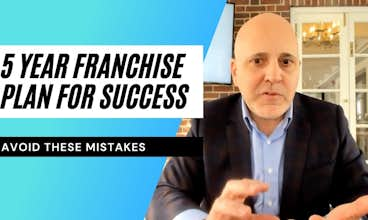Franchise expert Lisa Linkowsky shares strategies for recruiting qualified candidates and scaling efficiently.
As an emerging franchisor, selling franchises is a critical part of growing your franchise system.
Unfortunately, navigating the franchise sales process isn’t always easy. From uncertainty about how much time and money to invest in marketing and franchise development, to social media algorithms that sometimes promote too-good-to-be-true ideas about franchising, new franchisors are often left feeling confused and defeated when identifying the best ways to scale their brands.
“I think it (comes down to) education, because social media filters on people when they are, you know, drunk-searching at two o’clock in the morning. They've had a couple whiskies or wines and that algorithm finds them, and they start hearing what they want to hear instead of what is reality,” says Lisa Linkowsky, a Certified Franchise Consultant and the founder of Milestone Franchising, a firm that matches entrepreneurs with personalized franchise opportunities across a variety of industries.
So how can franchisors overcome those challenges and reach prospective franchise buyers more effectively in the real world? Below, we’ll explore strategies for developing a more robust franchise sales process focused on transparency, accountability and validation – key qualities that can set your brand apart in a competitive marketplace.
1. Understand your franchise opportunity profile
Although different types of franchise offerings demand different levels of commitment from franchisees, most require a significant investment of time, money and resources to succeed. Because of that, differentiating your franchise offering by determining its opportunity profile is a critical part of the franchise sales process.
“In the last couple of years … the bane of my existence has been the search for the elusive passive (income) unicorn. People are landing on my doorstep saying, ‘I wanna make millions but I don't want to have to do much. What do you got for me?’ And I'm like, ‘Who's this? Wrong number,’” Linkowsky says.
To avoid attracting mismatched candidates, consider developing a marketing strategy that communicates the following:
Investment level. Is your offering a low-cost investment, or does it require a higher level of financial investment from franchisees?
Lifestyle opportunity. Is your offering suited to someone seeking flexible, part-time work, or is it a better fit for franchisees who can commit to working full-time on-site?
Income potential. Is your offering a good match for buyers seeking supplemental income, or is it better suited for candidates seeking full-time replacement income or the creation of generational wealth?
By communicating the level of time and money your franchise offering requires, you can attract candidates whose goals and needs align with yours.
2. Communicate effectively – and quickly
Whether your franchise system has been in business for one year or two decades, establishing a franchise sales process and marketing strategy can help you stay organized while communicating your offering’s value.
Building a sales website and telling a compelling brand story, ideally in video format, are important components of the franchise sales marketing process. It’s also important to ensure that you’re communicating with leads quickly to avoid missed opportunities.
“I do worry when a franchise system is operating on all cylinders and they're starting to misfire. They're not responding and they're not getting back to my candidate. I've had that happen, where (franchisors) don't even set up the introduction meeting,” Linkowsky says.
To avoid losing sales due to laggy communication, consider imposing a 24-hour response time for all sales inquiries. Linkowsky also advises franchisors to limit their use of automated communication during the franchise sales process – something she thinks can potentially turn prospective buyers off.
“The more automated that we're all getting … I feel like it also can be hurting this process. Because that human interaction, when you're making one of the most important decisions of your life, is really critical,” Linkowsky says.
3. Be transparent about numbers
Nobody wants to invest in a business that won’t align with their financial goals. Because of that, transparency during the franchise sales process is important – especially when it comes to your Franchise Disclosure Document (FDD), an important legal document franchisors are required to provide to franchisee candidates during the sales process under the federal Franchise Rule.
To ensure your FDD is competitively positioned, developing a detailed Item 19 Financial Performance Representations can be helpful – even if you’re a new or emerging franchisor without existing franchisees.
“If a business is opting not to show an Item 19, I won't even show them (to clients). Forget it. … If you've been in business a few years, you don't have to have any franchisees. Show your corporate numbers. Be all out there. Let people do a colonoscopy on your P&L,” Linkowsky says.
To ensure prospective buyers understand your offering’s unit economics and can set realistic financial expectations about their investment, address the following points during the sales process:
Unit economics
Profit and loss statements
ROI potential
Corporate gross revenue
Estimated initial investment
Projected operating costs
Marketing costs
Royalties and other fees
Other fees and expenses, as required by law
By demonstrating transparency as a franchisor, you can build trust with prospective buyers early in the franchise sales process.
4. Validate franchisee candidates’ capitalization
While it’s important for franchisors to demonstrate transparency with franchisee candidates, it’s equally important that prospective buyers can meet their financial obligations as future franchisees.
“I literally have had (candidates) where they've got $20,000 in their checking account, but they have half a million in their retirement and they're 55 years old. What do you think I'm going to say to them? This is not something that you should be doing,” Linkowsky says.
To ensure that prospective buyers are properly capitalized, take time to validate their financial situation and make sure it’s aligned with Item 7 of your FDD – including their liquid capital and ability to secure financing. Evaluating reserve capital, along with the candidate’s financial expectations and goals, is also important for helping prospective buyers understand that the cost of buying a franchise involves more than franchise fees and startup expenses.
5. Identify and fix red flags
As a new or emerging franchisor, knowing the warning signals of a franchise system that’s gone off-track is critical for managing the franchise sales process. It’s equally important to know when and how to course-correct before an oversight negatively impacts your brand’s growth.
Common mistakes franchisors make that can impact franchise sales include, but aren’t limited to, the following:
Stretching themselves too thin. New franchisors that still work in their initial corporate locations often have limited availability. To grow a franchise system, it’s important to focus on sales and development without distractions or competing obligations.
Not investing in growth. Investing in marketing, franchisee recruitment, franchise sales and development is necessary for scaling a franchise brand.
Bad communication. Automated responses aren’t a replacement for timely, thoughtful and authentic communication with prospective franchise buyers, brokers and franchisees.
Lack of accountability. Understanding your obligations to franchisees is critical for success as a franchisor.
Poor franchisee validation. Because a lack of validation can discourage prospective buyers, actively supporting the needs of existing franchisees is critical.
As a franchisor, your primary obligation is to support your franchisees in succeeding as business owners. While you don’t need to give in to every demand your franchisees make, it’s important to adopt a growth-oriented mindset and take their needs seriously. Without validation from your existing franchisees, prospective buyers may seek alternate opportunities with franchisors they feel more confident in.
“One of the questions I have my candidates ask is, ‘How's the support from the franchise system?’ And (existing franchisees) get to say, ‘Excellent. Like, they're there. I snap my fingers. They're there. They're responsive. They take care of me. They react,’” Linkowsky says.
To learn more about Milestone Franchising, visit milestonefranchising.com.





